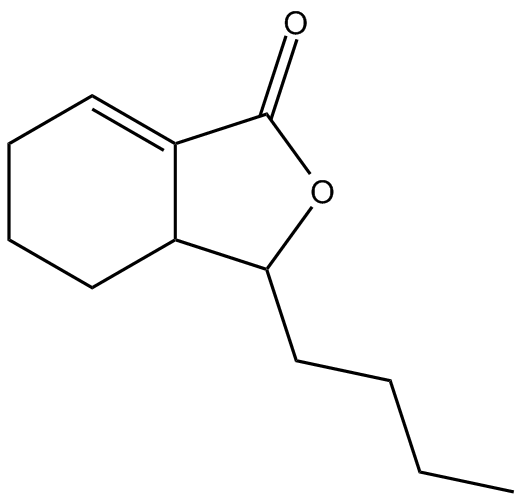Sedanolide |
| Katalog-Nr.GC15216 |
Sedanolid, eine natÜrliche Verbindung, die in essbaren DoldenblÜtlern vorkommt, besitzt entzÜndungshemmende und antioxidative Wirkungen.
Products are for research use only. Not for human use. We do not sell to patients.

Cas No.: 6415-59-4
Sample solution is provided at 25 µL, 10mM.
Sedanolide is a natural compound produced in edible umbelliferous plants, such as Celery seed oil [1].
In HepG2 and CaCo-2 cells, treatment with sedanolide (7-500 μM) for 24h showed no effect on cell viability. In HepG2 cells cultured in sedanolide-free medium, sedanolide (500 μM) treatment for 72h decreased cell viability. Pretreatment with sedanolide (100 μM) for 24 h and exposement to either H2O2 or tBOOH did not exhibit statistically significant difference in viability from controls. In HepG2 following 24-h incubation with 500 μM sedanolide, a significant increase in DNA strand breaks was observed. Sedanolide did not modulate H2O2- and tBOOH-induced DNA damage. Sedanolide was relatively nontoxic to cells in culture [1]. Sedanolide (SN) possesses antioxidant effects. In human liver cancer (J5) cells, treatment with sedanolide suppressed J5 cell viability by inducing autophagy. Sedanolide decreased protein expression levels of phosphoinositide 3-kinase (PI3K)-I, mammalian target of rapamycin (mTOR) and Akt and increased PI3K-III, LC3-II and Beclin-1 protein levels. Sedanolide increased the cytosolic phosphorylation of inhibitor of kappa B (IκB) and nuclear p65 and the DNA-binding activity of NF-κB. Sedanolide induced J5 cell autophagy by regulating PI3K, p53 and NF-κB autophagy-associated signaling pathways in J5 cells [2]. Sedanolide (100 μg/ml) inhibited cyclooxygenases-1 and -2 at 250 pg/ml and blocked topoisomerase-I and-II activity [3].
References:
[1] Woods J A, Jewell C, O'Brien N M. Sedanolide, a natural phthalide from celery seed oil: effect on hydrogen peroxide and tert-butyl hydroperoxide-induced toxicity in HepG2 and CaCo-2 human cell lines[J]. In Vitro & Molecular Toxicology: A Journal of Basic and Applied Research, 2001, 14(3): 233-240.
[2] Hsieh S L, Chen C T, Wang J J, et al. Sedanolide induces autophagy through the PI3K, p53 and NF-κB signaling pathways in human liver cancer cells[J]. International journal of oncology, 2015, 47(6): 2240-2246
[3] Momin R A, Nair M G. Antioxidant, cyclooxygenase and topoisomerase inhibitory compounds from Apium graveolens Linn. seeds[J]. Phytomedicine, 2002, 9(4): 312-318.
Average Rating: 5 (Based on Reviews and 14 reference(s) in Google Scholar.)
GLPBIO products are for RESEARCH USE ONLY. Please make sure your review or question is research based.
Required fields are marked with *




